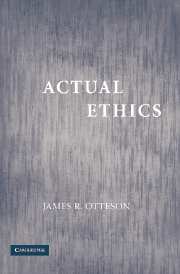PART II - APPLYING THE PRINCIPLES
Published online by Cambridge University Press: 17 November 2009
Summary
The chapters of Part I were intended to sketch both a principled and an empirical case for the classical liberal state. The principled case drew on the notions of human ‘personhood’ and ‘judgment,’ and on the notion of ‘justice’ and the General Liberty principle they implied. The empirical case showed that evidence supports the classical liberal state as well: on balance, everyone, including the poor, does better in states approximating the classical liberal ideal than in other kinds of states.
Now, in Part II, I turn to a handful of presently vexing practical moral and political problems, and I investigate how the conceptual tools and empirical evidence developed in Part I can address them.
Part II is not by any means exhaustive: there are a number of other problems I might have discussed. My hope instead is that by addressing these few it will become clear how the general position I defend would address other issues not explicitly discussed.
- Type
- Chapter
- Information
- Actual Ethics , pp. 199 - 200Publisher: Cambridge University PressPrint publication year: 2006



